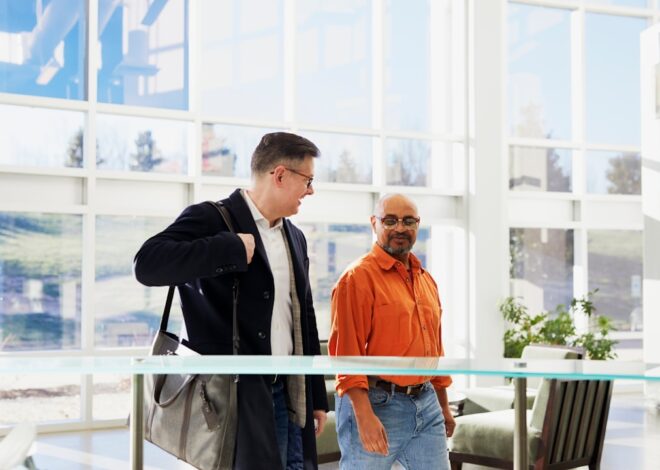
Empowering Seniors with Technology
In an increasingly digital world, the integration of technology into daily life has become essential for individuals of all ages. However, seniors often find themselves at a crossroads when it comes to embracing these advancements. The rapid pace of technological change can be daunting, leading to feelings of exclusion or inadequacy.
Yet, empowering seniors with technology is not merely about providing access; it is about fostering independence, enhancing quality of life, and bridging the generational divide. By equipping older adults with the necessary tools and knowledge, we can help them navigate the digital landscape, enabling them to connect with loved ones, access vital services, and engage with their communities. The importance of this empowerment cannot be overstated.
As the population ages, the number of seniors who are tech-savvy is steadily increasing. This demographic shift presents an opportunity to leverage technology to improve the lives of older adults. From social media platforms that facilitate communication with family and friends to health monitoring devices that promote wellness, technology can serve as a powerful ally in enhancing the lives of seniors.
By understanding the benefits and addressing the barriers to technology adoption, we can create a more inclusive society where seniors are not left behind but are active participants in the digital age.
Key Takeaways
- Seniors can benefit greatly from technology, which can improve their health, well-being, and overall quality of life.
- Technology can help seniors overcome barriers such as isolation, mobility issues, and access to information and resources.
- Popular technology devices and apps for seniors include smartphones, tablets, health monitoring devices, and communication apps.
- Technology can improve seniors’ health and well-being through telemedicine, health tracking apps, and social connection platforms.
- Seniors can stay safe and secure online by following tips such as using strong passwords, being cautious with personal information, and staying updated on online scams and fraud.
Benefits of Technology for Seniors
The benefits of technology for seniors are manifold and can significantly enhance their quality of life. One of the most notable advantages is improved communication. With tools such as video calling applications like Zoom or Skype, seniors can maintain relationships with family and friends regardless of geographical distance.
This connectivity is crucial for combating loneliness and isolation, which are prevalent issues among older adults. Regular interaction through digital means can foster a sense of belonging and emotional support, contributing positively to mental health. Moreover, technology offers seniors access to a wealth of information and resources that can empower them in various aspects of their lives.
Online platforms provide educational opportunities, allowing seniors to learn new skills or hobbies from the comfort of their homes. Websites like Coursera or Khan Academy offer courses on a wide range of subjects, from art history to computer programming. This access to knowledge not only stimulates cognitive function but also encourages lifelong learning, which is essential for maintaining mental agility as one ages.
Overcoming Barriers to Technology Adoption for Seniors

Despite the numerous benefits that technology offers, many seniors face significant barriers to adoption. One primary obstacle is the lack of familiarity with digital devices and applications. Many older adults did not grow up with technology and may feel overwhelmed by the complexity of modern devices.
This unfamiliarity can lead to frustration and a reluctance to engage with technology. To address this issue, it is essential to provide tailored training programs that cater specifically to seniors’ needs, focusing on user-friendly interfaces and practical applications. Another barrier is the perception that technology is not designed for older adults.
Many seniors may believe that digital tools are primarily targeted at younger generations, leading to feelings of alienation. To counteract this mindset, it is crucial to promote inclusive design principles in technology development. Companies should prioritize creating devices and applications that are intuitive and accessible for all age groups.
Additionally, community initiatives that showcase how technology can enhance daily living for seniors can help shift perceptions and encourage greater engagement.
Popular Technology Devices and Apps for Seniors
| Device/App | Features | Benefits for Seniors |
|---|---|---|
| Smartphones | Large screen, voice commands, simple interface | Stay connected with family, access health apps |
| Tablets | Touchscreen, lightweight, easy to use | Read books, watch videos, play games |
| Health Apps | Medication reminders, fitness tracking | Manage health, stay active |
| Video Calling Apps | Simple interface, large buttons | Connect with family and friends, reduce isolation |
Several technology devices and applications have gained popularity among seniors due to their user-friendly features and practical applications. Tablets, such as the iPad or Samsung Galaxy Tab, are particularly favored for their large screens and touch interfaces, making them easier to navigate than traditional computers. These devices allow seniors to access social media, read e-books, and even participate in online classes with relative ease.
In addition to tablets, smartphones have become indispensable tools for many older adults. Applications like WhatsApp and Facebook Messenger enable instant communication with family members and friends, while health-related apps such as MyFitnessPal or Medisafe help seniors manage their wellness routines effectively. Furthermore, wearable devices like smartwatches can monitor vital signs and send alerts in case of emergencies, providing peace of mind for both seniors and their caregivers.
How Technology Can Improve Seniors’ Health and Well-being
Technology plays a pivotal role in enhancing the health and well-being of seniors by facilitating better management of chronic conditions and promoting healthy lifestyles. Telehealth services have emerged as a game-changer in healthcare delivery for older adults. Through virtual consultations, seniors can connect with healthcare providers without the need for transportation, which can be a significant barrier for those with mobility issues.
This convenience not only saves time but also ensures that seniors receive timely medical advice and follow-up care. Moreover, health monitoring devices have become increasingly sophisticated, allowing seniors to track their health metrics in real-time. For instance, blood pressure monitors that sync with smartphones enable users to keep a close eye on their cardiovascular health.
Similarly, glucose monitors for diabetics provide instant feedback on blood sugar levels, empowering seniors to make informed decisions about their diet and medication. These technologies not only enhance self-management but also foster a sense of autonomy among older adults.
Tips for Seniors to Stay Safe and Secure Online

As seniors become more engaged with technology, it is crucial for them to understand how to navigate the online world safely. Cybersecurity threats such as phishing scams and identity theft are prevalent, making it essential for older adults to adopt best practices for online safety. One fundamental tip is to use strong passwords that combine letters, numbers, and special characters.
Seniors should also be encouraged to change their passwords regularly and avoid using easily guessable information such as birthdays or names. Additionally, awareness of suspicious emails or messages is vital in preventing scams. Seniors should be educated on how to identify phishing attempts—such as emails that request personal information or contain links to unfamiliar websites—and encouraged to verify the source before clicking on any links or providing sensitive information.
Utilizing security software on devices can also provide an added layer of protection against malware and viruses.
The Importance of Digital Literacy for Seniors
Digital literacy is an essential skill set that empowers seniors to navigate the complexities of modern technology confidently. It encompasses not only the ability to use devices but also an understanding of how to evaluate online information critically and engage responsibly in digital spaces. As misinformation proliferates online, equipping seniors with the skills to discern credible sources from unreliable ones becomes increasingly important.
Furthermore, digital literacy fosters independence among older adults by enabling them to access essential services online—such as banking, shopping, and healthcare—without relying on others for assistance. Programs aimed at enhancing digital literacy should focus on practical skills tailored to seniors’ everyday needs, ensuring they feel competent and confident in their ability to engage with technology.
Resources and Programs for Seniors to Learn and Access Technology
Numerous resources and programs exist to support seniors in learning about technology and improving their digital skills. Community centers often offer workshops specifically designed for older adults, covering topics such as basic computer skills, internet safety, and social media usage. Libraries also play a crucial role by providing free access to computers and internet services while hosting classes that cater to varying skill levels.
In addition to local initiatives, online platforms such as Senior Planet offer a wealth of resources tailored for older adults seeking to enhance their technological proficiency. These platforms provide tutorials on various topics ranging from smartphone usage to online shopping safety. Furthermore, many non-profit organizations focus on bridging the digital divide by providing free or low-cost devices to seniors who may not otherwise have access.
By leveraging these resources and fostering a culture of learning and support around technology use among seniors, we can create an environment where older adults feel empowered rather than intimidated by the digital world. This empowerment not only enhances their quality of life but also enriches our communities as a whole by promoting inclusivity and connection across generations.
FAQs
What is technology for seniors?
Technology for seniors refers to the use of various technological devices, software, and applications that are specifically designed to meet the needs and preferences of older adults. This can include devices such as smartphones, tablets, wearable technology, and specialized software for health monitoring, communication, and entertainment.
What are the benefits of technology for seniors?
Technology for seniors can provide numerous benefits, including improved communication with family and friends, access to health monitoring and telemedicine services, opportunities for social engagement, cognitive stimulation through brain training apps, and access to entertainment and information.
What are some examples of technology for seniors?
Examples of technology for seniors include simplified smartphones with larger buttons and screens, wearable health monitoring devices, medication reminder apps, video calling platforms for staying in touch with loved ones, and smart home devices for safety and convenience.
How can technology help seniors with health and safety?
Technology can help seniors with health and safety by providing access to telemedicine services, medication reminders, fall detection and emergency response systems, health monitoring devices for tracking vital signs, and smart home technology for controlling lighting, temperature, and security.
What are some considerations when choosing technology for seniors?
When choosing technology for seniors, it’s important to consider factors such as ease of use, accessibility features, customer support, privacy and security measures, compatibility with existing devices, and the specific needs and preferences of the individual. It’s also helpful to seek out user reviews and recommendations from other seniors.


